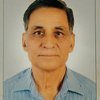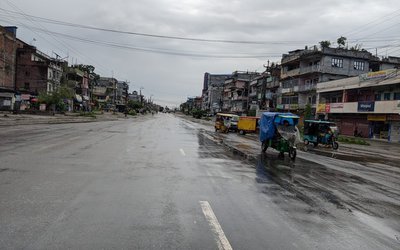Reason is a mental faculty which is logical. It follows its own rules and tends to be rigid or inflexible in its decision. Analytic reason, on its own, can take us to the gate of reality, but can never enter that gate because the very instrument of reason cannot account for what is beyond it. The knowing is then not through rational thinking but through direct perception that transcends sense perception. Understanding starts with our quest to understand our inners experiences which are often incapable of being expressed through rational part alone. Understanding does not exclude the rational part, but it includes also those elements of understanding which transcend the limits of sense organs as well as of belief and faith. Understanding is a process that accumulates on itself as we grow in knowledge, but it is not the end in itself, but only a means to that end. It employs both the mind and the heart or the mental acumen and the purity of the heart. “Understanding is the vision of your inner being, the sight of your soul, the telescope of our heart...It is the searchlight that illumines your way and brings success…If your understanding is governed both by the head and the heart, then you have clear vision of the final truth” says Paramahansa Yoganenda.
Understanding human relations is not a matter of scientific analysis. It depends on our understanding of our life which is not the same thing we call intellectual equipment. The quality or the depth of understanding grows with our experience of life, our experience in pursuing our common ideals and values when these experiences are not limited by rational understanding. Understanding is evolutionary; not a fixed concept; “it is a contagion of the spirit” says Radhakrishnan. Reflections and contemplations are the two very important faculties that enhance the quality of understanding. Understanding consists in thinking, acting and experiencing ever higher levels of experiences in an ascending order, and thus growing in knowledge. Every time we look in the face of every experience with intelligent discrimination until we understand it, we grow in experience and add something to our experience, - inner as well as outer. We may call it seeking understanding through understanding. Understanding then grows and builds on itself; it is accumulative and self-expanding. The ultimate measure of how we understand understanding depends on how we behave or act in our real life. In the end, conduct and conduct alone is what makes us who we are, and this depends on how we understand understanding. Here we descend from theory to the act of living into life.
Although understanding has ultimately to transcend reason, it does not mean that understanding can dispense with reason; we cannot obviate it. Seeking understanding through understanding is a discriminative process, but we can transcend reason only when we know its limits. Reason is not then under evaluated, it is simply made aware of the fact that it can go only this far and not beyond it, but reason lends us its shoulders to see what lies beyond its horizon. Our objective is here to lessen the seemingly irreconcilable contradiction between the “inner” and the “outer”, and to facilitate the transition from reason to understanding. Here we do not try to remove this contradiction by sidelining the reason rather we try to solve it by understanding the limits of reason. We thank the reason for it carried us thus far, and proceed ahead. Understanding is primarily a mental activity that functions as a link between the mind and the spirit, but both reason and understanding are only the means, not the final objective of our spiritual journey. But while the scope of reason varies within a limit, understanding encompasses much wider range, and almost all of them are of qualitative nature, and it is here where reason may fail us.
Understanding leads to Knowledge but it is Knowledge that leads to final realization. While understanding could be the sight of the soul, its source lies in the knowledge of the soul. Since understanding is a process of knowing, it is ever changing, evolving, expanding, but what is more important is that it grows in depth and intensity under the supervision of the ultimate knowledge or Knowledge. It involves verbal knowledge, experimentation and verification. We can understand this dynamic aspect of understanding only when what is understood flows spontaneously into our life as we live it both religiously and philosophically as both of them are the means of proper living. The journey from understanding to knowledge starts first from the level of rational thinking, but it must also be experienced in our life when life becomes livable and enjoyable. The body is then made an access point to higher reality. One is then able to free himself from the grossest base of his existence. Life becomes complete when knowledge is realized in life. We can best understand understanding when we start the journey from our inner experience. All other types of understanding can be understood in the light of this understanding, sometimes also called primary understanding as it transcends the logical, verbal and linear mental limitations. This inner experience has its roots in something that considers not only the experience of an individual but also the human experience, not only the experience of the external world but also that of the inner world. All these types of experiences are interrelated to the inner experience. Understanding then grows into Knowledge.
Understanding is a means of seeking the One, but it is the actual encounter with the One in life that leads to Knowledge. Approximately, understanding can be understood as an intellectual movement from cause to effect. This does do justice with the term, particularly from a scientific point of view, but the recent scientists, particularly the quantum physicists, have come to the conclusion that this view is rather limited. Some scientists even opine that perception and even contemplation have to play a creative role in new scientific discoveries. When we are deeply involved in creative thinking or in the science for understanding, we are in communion with the Sprit because creative thinking has its origin in the Spirit or creative intelligence. When we say we grow in knowledge we mean that knowledge is relative and cumulative and ads on to itself. Knowledge can then be understood as consisting of different levels of understanding. Generally, understanding also involves thought, imagination, reflections and contemplations. The combined understanding may lead us to certain decisions, - mental at lower level and spiritual at higher level. In the latter case, understanding is guided by Knowledge or final knowledge because Knowledge connotes the final destination whereas understanding is the process or the way to Knowledge but a process is not the final goal. Understanding is not the actual encounter with Truth as this Truth passes understanding. This is what Jean-Paul Sartre means when he says: “Being is not subject to the determinations of understanding”. Of course, Truth has always existed, but its knowledge exists at different stages of development. Therefore, both truth and knowledge have different degrees that depend on the level of our understanding. Both of them grow by analysis but finish by synthesis. This synthesis is materialized through understanding as understanding is synthetic as well as accumulative.
According to Eastern thinking, understanding can be related to actions performed without an end in view when the mind does not control action. That is the only state in which thought process is not shaping action, and there is true understanding as understanding then transcends logical, verbal and linear mental limitations. Clearly, the act of understanding of human life is subtler than the physical understanding of matter as we then turn our attention towards the center of our existence. Understanding grows into knowledge through our actions performed without an end in view. But one has to be aware of whether the ensuing understanding is limited to intellectual understanding or whether it is the understanding of the Truth. Understanding related to the conditioned mind is not enough as psychological inconsistencies related to conditioned mind may still create psychic blockages, because the EGO may still be there. These psychic blockages can be cleared only by psychological transformation of mind which deserves a complete chapter.
Intuition is considered to be related to subconscious level of our mind. In the still of our mind we may sometimes be intuitively aware of our subconscious level of our mind. As it stands now, we don’t know its full potential, but the experience shows that this experience has its origin in our subconscious mind. We become aware of the power of subconscious mind because the explanation of that particular experience lies in the fact that subconscious mind accepts it. It is as if the cause is verified by the effect; it is as if the experience has the remembrance of its cause. Initially, however, these experiences are not likely to be of permanent nature, but once we learn to co-relate understanding to daily life and live it, the act of living and understanding through living complement and enrich each other and remove these psychic barriers. In the end, it is our action or our behavior that counts most, but action and experience of living go hand in hand. We may now say that the act of living and spiritual progression consists of learning, understanding, acting as per understanding and experiencing the spiritual transformation. Obviously, spiritual transformation can start only when one begins to experience that which is beyond physical and mental, and this comes through psychological experiences. When we accept these limitations we open ourselves to higher dimensions of our existence or higher levels of energy and stop identifying ourselves with physical body and mental faculties such as fear/anxiety and insecurity. Freed from physical and mental limitations the spiritual journey must flow of its own accord, naturally, subjectively without our trying. Then it is altogether of different dimension of understanding.
Our spiritual journey is also living in action, but living in action through intellectual understanding is one thing, while to be there is another thing. One can be there only by actually taking part and being involved in the action and not by merely being involved in the intellectual understanding. In simpler words, the transition is here from being a spectator to being the real participant in the act of living our life. Of course, both are involved, but the participant is on a different level of involvement. It is he who really takes the risk of racing and must know what is demanded of him. Understanding is the beginning of the real act of living, and proper living is living in our understanding of the Truth. In fact, we live properly only when we are in touch with the sacred Source of life,- the Truth. Understanding provides that touch and, at the same time, it becomes the means as well as the object of living. The transforming capacity of understanding lies in that it flows naturally or spontaneously into our life, and transforms our life firstly by a process of cleansing the psyche, but again we must first have some idea about the psyche and its limitations. Sri Aurobindo is perhaps the best reference in this case. Understanding then becomes an inward journey for Truth or Knowledge. The process of understanding then brings with it an experience of self-satisfaction, self-enjoyment and inner elevation. One can then feel the joy of understanding, - the upward looking joy. But while Truth is there irrespective of whether we know it or not, understanding undergoes changes, evolution and expansion and enriches itself through understanding as it is cumulative. It is the joy of understanding that is cumulative and finally grows into Knowledge.
Understanding is not limited by the bounds of reason and sprouts out from within, it, therefore, flows naturally when it is unobstructed by our thought structure and undergoes continual upgrading and leads to Knowledge, but it is Knowledge that leads to final realization. Understanding and knowledge are thus closely interrelated. We grow in knowledge through understanding, but Knowledge (the ultimate knowledge) cannot be acquired; it comes to us through “direct perception through unconditioned Intelligence” or through direct illumination. So, although understanding and knowledge are so intricately interrelated there is a gap between understanding and being established in Knowledge. This is because transition from understanding to Knowledge takes place through direct perception (or through grace which again occurs through perception or intuition), and this constitutes the unavoidable hiatus/gap between understanding and directly perceptible unconditioned intelligence/creative Intelligence. Transition from understanding to Knowledge is a qualitative transformation; it is a transition from conditioned mind to unconditioned Intelligence which explains the above mentioned gap between them. However, this hiatus exists from a philosophical point of view as philosophy cannot explain what the unconditioned Intelligence is or how direct perception occurs. Direct perception can be understood as revelation which can be learned only from within oneself by meditation.
The journey from conditioned mind to unconditioned Intelligence is not an easy one; it is fraught with two opposing tendencies. On the one hand, we have a natural tendency to identify ourselves with the body and conditioned mind or outer consciousness. On the other, we do feel in the mind of our minds and in the heart of our hearts that “I am not this body; I am not limited by my/outer mind”. In actual life, these two opposing tendencies somehow run parallel or independently showing that understanding and our mundane life are flowing in parallel lines. The first tendency is governed by mind-ego play which has a strong grip on our thoughts, words and deed, and which blocks the free flow of understanding into our life. We then succumb to attachments, expectations, fears etc. In the second case, we turn the search light inwards and actively take recourse to the transforming capacity of understanding assisted by the creative energy of our awareness. Understanding that so far was verbal and intellectual provides us with a radical insight that opens and links us to higher dimensions of energy that were not available in our normal experience of life. The resulting total awareness would lead to Consciousness. Understanding can now flow freely into our life, and we come out victorious. Of course, the negative tendencies associated with conditioned mind are there, they are recorded and acknowledged, but instead of being suppressed they are simply ignored and rendered useless or ineffective as fried seeds are. If they are simply suppressed they may remain submerged in our subconscious mind and create psychological problems when they are brought to the surface by the challenges of life. Much of the Western psychiatry basically involves around this concept.

Prof. Dr. Akal Bahadur Singh
Prof. Dr. Singh was one of the founding Pragya in the old pre-1990 RONAST. Recently he has been spending much of his time thinking about the relationship between science and spirituality.
- Sensations, Perceptions And Concentrations
- May 02, 2024
- Insights And Inspirations
- Oct 01, 2023
- Ideas, Actions And Experiences
- Sep 07, 2022
- Unity In Diversity
- Aug 16, 2022
- Pleasure, Happiness And Bliss – The Universal Unity Of Existence
- Jul 26, 2022















